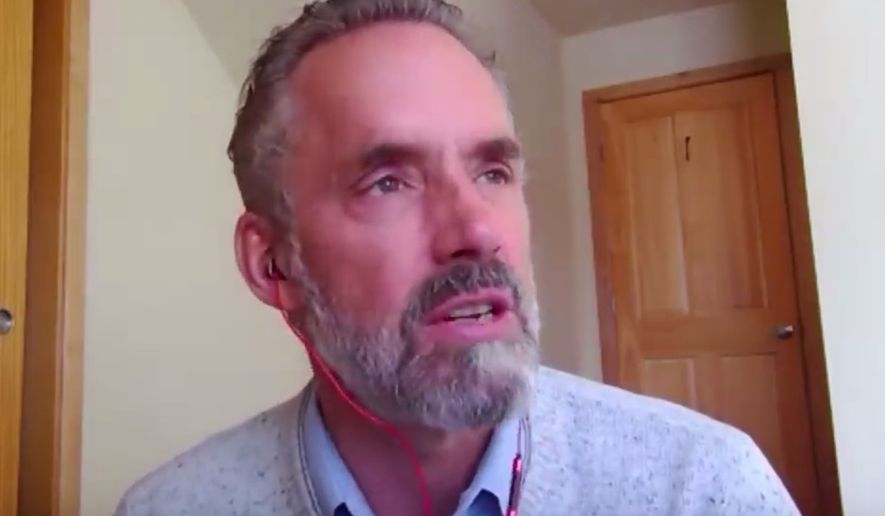A viral video of a high school debate contest last month in Arizona shows Utah students being disqualified for citing statements by conservative commentator Ben Shapiro and Canadian psychology professor Jordan Peterson, whom the judge calls “white supremacists.”
The Jan. 5 incident at the Hugh Downs School of Human Communication Invitational at Arizona State University in Tempe has evoked criticism of anti-conservative, pro-liberal bias in academia, where conservative speakers have been silenced and shouted down in recent years.
“This is just another absurd example of people foisting views on those with whom they disagree for purposes of demonization,” Mr. Shapiro, former editor-in-chief of Breitbart News, told The Washington Times in an email. “The judge is a joke, pure and simple.”
The 30-minute cellphone video, which has been viewed more than 500,000 times, begins while two white male students from Layton High School in Utah are debating immigration policy against two Hispanic female students from Juan Diego Catholic High School near Salt Lake City.
The girls had recited a slam poem arguing that they shouldn’t have to debate the topic because of the boys’ “privilege” and “caucasity.” Layton High senior Michael Moreno refers to Mr. Peterson and Mr. Shapiro, arguing that the girls are trying to stifle his speech using “class guilt.”
“We are held responsible for our ancestors, which has no linkage to us,” Michael says. “They just assume that we have privilege because other white people do.”
“Can you give me an equivalent of the KKK but for white people?” a Juan Diego debater asks.
“We think racism is bad,” Michael responds.
A visibly frustrated judge interrupts: “I specifically told you guys, ’Don’t read racist s—-.’ … This argument is inherently just like saying, ’Identity politics doesn’t matter and is bad.’ How is that OK?”
A short time later, the judge abruptly ends the debate, citing the students’ safety and claiming it is causing “actual psychological violence” against the girls.
“Why do you think that being endorsed by white supremacists like Ben Shapiro or Jordan Peterson is good?” the judge asks Michael as the teams are packing up.
Neither Mr. Peterson nor Mr. Shapiro has openly endorsed white supremacy. Mr. Peterson, who teaches psychology at the University of Toronto, has criticized political correctness, feminism, environmentalism and identity politics. Mr. Shapiro has called for lower taxes on the rich, repealing Obamacare, privatizing Social Security and making abortion a crime.
Before the end of the video, Michael discusses the judge’s decision with a debate organizer. The organizer says he believes the judge is wrong to shut down the contest but adds, “It’s his decision by what is persuasive in that context.”
“Or what is racist,” an unidentified off-screen voice says.
In a telephone interview with The Times, Michael said the judge warned him and his teammate before the debate to “not be racist.”
Emails seeking comment from the judge were not returned.
Officials with the National Speech & Debate Association in West Des Moines, Iowa, and ASU Forensics, which organized the debate, did not respond to requests for comment.
Observers of high school debate say the tension around identity politics has been growing for years. Jack McCordick, a Yale University student, wrote in America magazine that high school debate increasingly mirrors the nation’s polarized political climate.
“I sympathize with people who are trying to radically reshape what debate is,” said Mr. McCordick, a self-described liberal who notes that the image of an archetypical debater is of a “square-jawed white guy with a nice tie and khakis.”
But debaters looking to raise issues of privilege, identity, sexism and racism have often engaged in tactics that can shut down debate, he said, adding that “there’s an overcorrection.”
A 2016 broadcast of the podcast Radiolab featured a gay, black, first-generation college student from Kansas City engaging in an increasingly popular practice in which one team refuses to debate a resolution, claiming the contest’s premise is classist or racist. The tactic often stonewalls any rebuttal by white male debaters on topics of racial sensitivity.
Meanwhile, conservative speakers have encountered other types of silencing tactics on college campuses.
On Monday, Grand Canyon University in Phoenix, citing a campus “unity” policy, canceled a talk by Mr. Shapiro scheduled for this spring. Last year, former football star Burgess Owens, a black conservative commentator, was shouted down by students at Hobart and William Smith Colleges in Geneva, New York. In 2017, University of California, Berkeley canceled a speech by conservative commentator Ann Coulter amid concerns of violent protest.
• Christopher Vondracek can be reached at cvondracek@washingtontimes.com.




Please read our comment policy before commenting.